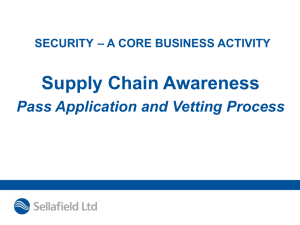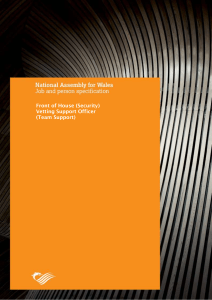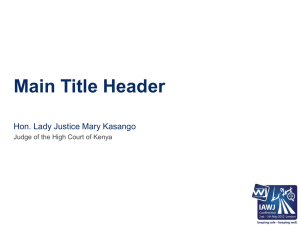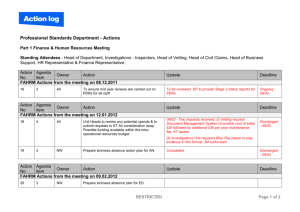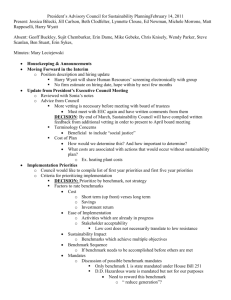Irish Version Guardian Consent Form Revised issued 25th May 2015
advertisement
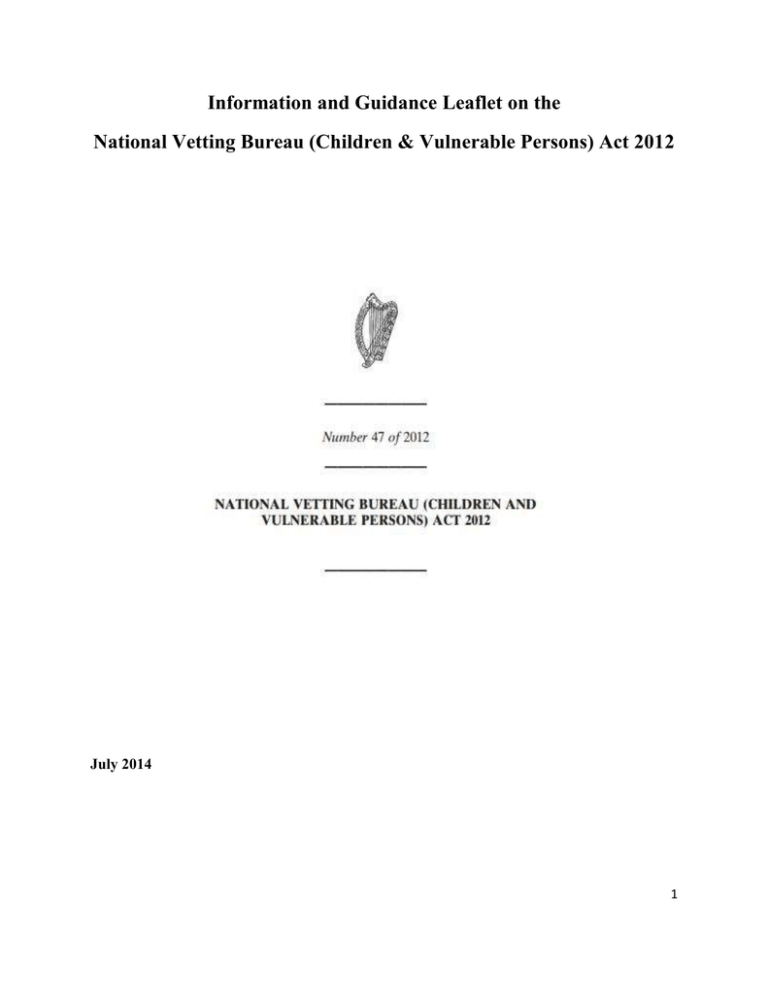
Information and Guidance Leaflet on the National Vetting Bureau (Children & Vulnerable Persons) Act 2012 July 2014 1 National Vetting Bureau (Children & Vulnerable Persons) Act The National Vetting Bureau (Children and Vulnerable Persons) Act 2012 is the vetting legislation passed by the Houses of the Oireachtas in December 2012. This legislation is part of a suite of complementary legislative proposals to strengthen child protection policies and practices in Ireland. Once the ‘Vetting Bureau Act’ commences the law on vetting becomes formal and obligatory and all organisations and their volunteers or staff who with children and vulnerable adults will be legally obliged to have their personnel vetted. Such personnel must be vetted prior to the commencement of their work with their Association or Sports body. It is important to note that prior to the Act commencing that LGFA policy stated that all persons who in a role of responsibility work on our behalf with children and vulnerable adults has to be vetted. This applies to those who work with underage players. (The term ‘underage’ applies to any player who is under 18 yrs of age, regardless of what team with which they play). The introduction of compulsory vetting, on an All-Ireland scale through legislation, merely formalises our previous policy and practice. 1 When will the Act commence or come into operation? The Act is effectively agreed in law but has to be ‘commenced’ by the Minister for Justice and Equality who decides with his Departmental colleagues when best to commence all or parts of the legislation at any given time. It is reported that the Act will commence by November 2014. 2 3 What sectors or services are subject to vetting? Providers of leisure or physical activities to children or vulnerable persons Schools Childcare Service Hospitals and health service Residential services or accommodation for children or vulnerable person Treatment, therapy or counselling services for children or vulnerable persons Providers of leisure or physical activities to children or vulnerable persons Who within the LGFA needs to be Garda Vetted in accordance with the Act? Coaches: In the context of the LGFA those members, i.e. coaches, trainers, mentors, parents and others who provide services to children and vulnerable adults, on behalf of the Association, and who are in direct contact with children or vulnerable persons in the LGFA shall be vetted. It should be noted that it will be illegal for an individual to put themselves forward to work with children or vulnerable adults before successfully completing the Garda Vetting Bureau process. Committee members: As a policy of best practice, it is strongly recommended that Officers of Committees that oversee underage and juvenile activities at Club and County level should also be vetted. Referees: Referees must also be vetted. 2 4 What action should the Club take now prior to the commencement of the Act? In advance of the commencement of the Vetting Bureau Act, all Clubs, through their Children’s Officer, should check through an ‘assessment of compliance procedure’* that every person working with underage players has been vetted. This includes coaches, trainers, relevant Club personnel and any other person who regularly provide a service to underage teams. *Assessment of compliance procedures: This is a process whereby the Club Children’s Officer obtains a list of all persons in their Club who currently on behalf of the Association work with underage players or vulnerable adults. The Club Children’s Officer then checks this list against the names of people in their Club who to date have been satisfactorily vetted by the LGFA or the GAA. This enables them to identify if there are any gaps in the list of people vetted when compared with the list of those working with underage players. If there are any gaps, then these people should be required to immediately submit a vetting application form as per normal channels. 5 Are there any exemptions from vetting for occasional or temporary roles? At the discretion of the local Club or unit it shall be permissible for a person acting in an occasional or temporary role, who has not previously been vetted by the LGFA, to fulfil this role as per the following conditions: The person must be known to the local Club or unit A non vetted individual may only carry out a ‘temporary’ role for a maximum of three occasions per year All such persons must be over 18 yrs of age They must, in advance of commencing their role, complete and submit a vetting application form (e.g. AccessNI/ Garda Vetting) They must sign a copy of the Code of Behaviour – Underage They must at all times be under the supervision of a vetted volunteer/staff person 6 If previously vetted by the LGFA does a person have to be re-vetted once the Act commences? We are advised that in if an individual has been previously vetted by the LGFA as part of their role in the Association prior to the commencement of the Act, that it is not necessary to re-vet that individual except in accordance with the regulated re-vetting period, i.e. when all persons must be re-vetted after an agreed number of years. We do however reserve the right to re-vet any member at any time. An amendment to the Act also clarifies this position. 7 Whose responsibility is it to ensure Vetting is carried out? In theory each unit of the Association, as the ‘employee’ of a volunteer or paid person, is responsible for vetting. The Association however, as the governing body, has overall responsibility and must ensure that all aspects of the law on vetting have been implemented. 3 The implementation of vetting at both Club and County level is normally overseen by the Children’s Officer (see Role of County and Club Children's Officer leaflet). It is the Children's Officer in first instance who will identify if a person with a relevant role, requires to be vetted. The LGFA will process vetting applications, on behalf of our membership, with the National Vetting Bureau as vetting requests are received from our affiliated Clubs or units. 8 How do individuals complete their vetting application form under the new Act? There is no fundamental difference proposed regarding the completion by LGFA personnel of the new vetting form when compared with current vetting practices. County and Club Children’s Officers will ensure that all persons who are required to be vetted receive a vetting form and complete it in accordance with Association procedures. Vetting application forms will be emailed by the Association to each County who shall in turn liaise with their County and Club Children’s Officers on the distribution of the forms at County and Club level. Club Children's Officers will ensure that any person deemed eligible to be vetted will complete the application form. All applicants deemed to have satisfactorily completed the vetting process, following the processing of their application by the National Vetting Bureau, will receive a LGFA Garda Vetting acceptance letter. This letter will be posted to the home address of the applicant. 9 What is a Garda Vetting acceptance letter? A Garda Vetting acceptance letter is the letter that each applicant receives when, following the processing of their application, the LGFA deems their vetting application to be acceptable in accordance with the role they have specified in their application. This is but one part of a recruitment process and the individual’s Club may put additional recruitment requirements in place, including training etc, before the applicant is permitted to take up their role at Club level. All vetting acceptance letters should be given to the Club Children's Officer as proof of satisfactory vetting as no individual may be permitted to work with children or vulnerable adults in the LGFA without having received such a letter. 10 Vetting in Ulster In accordance with previous practices Ulster LGFA through Ulster GAA co-ordinates the vetting practices of all persons deemed eligible to be vetted in the six Counties under the jurisdiction of Northern Ireland. 11 Is it an offence to fail to vet a LGFA coach or mentor working with children? Yes, it is an offence if we fail to vet a LGFA coach who subsequently works with children on our behalf. Section 12 of the Act prohibits the engagement of persons to do relevant work or activities relating to children or other vulnerable persons, unless that person has been subject to the vetting procedures under the Act. 4 It should be noted that it is illegal for an individual, e.g. a coach, to put themselves forward to work with children or vulnerable adults before successfully completing the Vetting process. Therefore a person may only work in such a capacity after they have been successfully vetted via the Association and are in receipt of their ‘GAA vetting acceptance letter’. (See possible exemptions under Q5) 12 What will the LGFA do on receipt of vetting disclosures? Where a vetting disclosure contains details of criminal records or specified information, the LGFA must make available a copy of the disclosure to the vetting applicant. The organisation will also consider the information in a confidential and sensitive manner. In consideration of the information contained in a ‘disclosure’ the Association will assess the suitability of the applicant to do relevant work or activities on our behalf. This shall be done in a safe, confidential and impartial manner and a risk assessment will be carried out as to the suitability of the person with the disclosure to fulfil the role(s) for which they have applied. It is the LGFA National Children’s Officer that makes the decision as to whether a vetting applicant, in accordance with our recruitment requirements, may be deemed acceptable. 13 What is specified information in the Act? This is information other than details of a criminal conviction. It is information that is considered to give rise to a bona fide concern that a person may harm a child or a vulnerable person. Only information arising from a statutory inquiry or Garda investigation can constitute ‘specified information’. If such information is going to be disclosed to the LGFA relating to one of our applicants the Chief Bureau Officer must, in advance, notify the vetting subject of the intention to disclose the information. 14 What is the process for disclosing specified information? A decision to disclose the specified information can be made only if the Chief Bureau Officer, in the Garda Vetting Bureau, believes following an assessment that the information in question is of such a nature as to give rise to a bona fide concern that the vetting subject may harm, attempt to harm or put at risk of harm a child or vulnerable person. The Chief Bureau Officer must be satisfied that the disclosure is necessary, proportionate and reasonable in the circumstances in order to protect children or vulnerable persons. The vetting subject must be informed of the intention to disclose the information and informed that he or she may appeal the decision. 15 Procedure for the retention of Vetting Disclosure information by the LGFA Under the Data Protection legislation a vetting disclosure would constitute “sensitive personal information”. Such legislation requires that data shall be kept for “no longer than is necessary”. The LGFA believes that such information should be retained by the Association as long as the person is in membership of the Association or continues to provide a service or services to any 5 unit of the Association. In certain circumstances it may also be appropriate, subject to legal advice, to retain such information after the individual has left the Association. 16 What should a Club do if the applicant has previously been vetted by another organisation? The Data Protection Acts prevents the use of "sensitive personal information" for purposes other than the purpose for which the data was collated. Therefore, a person who has completed a vetting procedure with another sports organisation or as part of their employment elsewhere cannot be considered to have been vetted for all sports activities or organisations. Each organisation will have to complete vetting of its own personnel, either paid or voluntary or may with the agreement of the applicant request that they seek their latest vetting disclosure from another organisation and share this with you – if you find this practice acceptable. This however can only be seen as an interim vetting measure as the applicant must still be vetted on commencement of their role with the LGFA. 17 How long should Club retain vetting information i.e. the vetting acceptance letter? Every applicant who is deemed to have satisfactorily completed the vetting procedure in the LGFA will receive a vetting acceptance letter to that effect from the LGFA National Children’s Officer. This letter must be shared with the Club as proof that they have been satisfactorily vetted. The Club must retain the letter, or a copy of the letter, for as long as the individual is working on their behalf with children or vulnerable adults in the Club or as part of the Club’s services e.g. to schools etc. This information should be retained by the Club Children's Officer or Registrar or another nominated person in a safe and confidential place. This letter is only valid until such time as the individual has to undertake re-vetting in accordance with the re-vetting directives of the Act or of the Association. 18 What about re-vetting, previously vetted and retrospective vetting? The Act provides for the re-vetting of ‘employees’ which by definition includes volunteers. However, retrospective vetting of current volunteers/employees who have not yet been vetted will be prioritised over re-vetting. It may be that an order to enable re-vetting (in the Act) may not be signed for a number of years. The LGFA is supportive of re-vetting and will insist that all persons who undertake the vetting process shall be re-vetted within a five year time period. Each Club/County Children’s Officer will be informed as to when we will commence the revetting of personnel in the LGFA and this will take place in an agreed and coordinated manner. The LGFA deems that any person vetted by us prior to the commencement of the Vetting Bureau Act has been vetted in good standing and that this vetting remains in place until they have been re-vetted by us under the new Act. Once vetted under the new Act an individual will be subject to the terms of the new Act and will also have to be re-vetted in accordance with any regulations or re-vetting orders made by the Minister and/or by the LGFA. 6 19 What about vetting for coaches and mentors under 18 years old? LGFA vetting policy is that any person under 18 years of age who assists an adult coach in their duties must also vetted. The consent of a parent/guardian is required for vetting persons under 18 years of age. 20 Is there a fee charged for vetting applicants? There is currently no intention to charge fees to the community, sports and voluntary sectors for accessing the Garda Vetting Bureau services. 21 Will the current vetting form be changed? Yes, a revised form, with many additional questions, will be issued and an on-line form is also being considered following the completion of a pilot on-line project Forms will be distributed at local Club level and submitted to the LGFA National Children’s Offices, as per previous procedures, for processing with the Garda Vetting Bureau on our behalf. Confidentiality LGFA personnel may be assured that all vetting applications received from our members will be processed in a confidential manner. Where an application from individual results in a disclosure detailing criminal records or specified information relating to the applicant, the LGFA may consider and take into account the information disclosed when assessing the suitability of the person to do relevant work or activities on our behalf. Further information: For information on vetting applications made by the LGFA to the Garda Vetting Bureau contact: Paula Prunty, LGFA National Children’s Officer, Croke Park, Dublin 3 Tel: 01 8363156 paula@ladiesgaelic.ie For information on AccessNI criminal record disclosure services please contact: Ulster GAA, 8-10 Market Street, Armagh BT61 7BX. Tel: 028 375 21900 bernie.fox.ulster@gaa.ie 7
